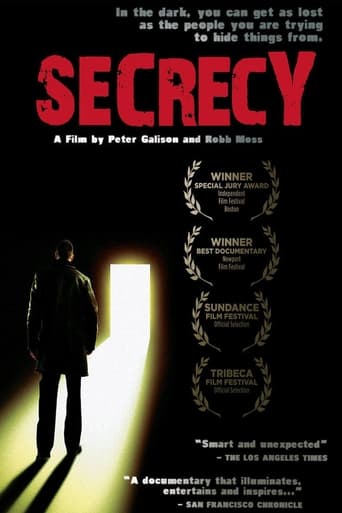Grimerlana
Plenty to Like, Plenty to Dislike
GurlyIamBeach
Instant Favorite.
FirstWitch
A movie that not only functions as a solid scarefest but a razor-sharp satire.
Sabah Hensley
This is a dark and sometimes deeply uncomfortable drama
dolphinna
This truly excellent film goes far beyond the basic expectation of a documentary to simply "inform." Visually exciting and thoroughly researched, it inspires reflection on how government secrets and democracy work together and -- perhaps more importantly -- how they do not. These reflections do not arise without effort, however. We have to earn them by remaining active thinkers throughout the movie. This is, in fact, the film's greatest contribution. So many filmmakers expect their audiences to receive information passively. It is refreshing to be presented with a film that assumes, from the start, that their viewers possess the ability to think critically.Highly recommended for a wide range of audiences, from students of various ages to government officials and interested citizens.
John Seal
We are lied to every minute of every day by our government-regardless of whether Republicans or Democrats are in power. The government then conceals those lies by claiming that to reveal the truth to the unwashed masses would endanger national security. This brilliant documentary takes a look at the pernicious spread of the culture of secrecy, starting with the 1948 Waycross, Georgia, plane crash that led to the Supreme Court's decision establishing the States Secrets Privilege. Now we are at the point where the feds claim that entire court cases cannot proceed because of this so-called Privilege. The Bush administration honed the use of the SSP to a fine art; unfortunately, the Obama administration shows no interest in reversing that policy. And why should they? As Secrecy makes quite clear, once you cede power to the executive branch, why would the executive branch choose to give it up? And why should we, the serfs of neo-liberal capitalism, expect any less from our wise masters? Every person who has any interest in constitutional government, democracy, and freedom needs to see this film.
randi75
I just saw this film at the San Francisco International Film Festival (in Berkeley) Without a lot of self-righteousness or bloviation, this film is superb. It takes a subject which may not lend itself well to film and makes it immediate and visual. The use of animation and music is masterful. The interlocutors (lighted beautifully) make you hang on to every word they say.It has a point, but it allows other viewpoints in, and not just straw men. The filmmakers give credible, reasonable arguments for taking a position which is ostensibly alternative to theirs. It actually stays away from, for the most part, the easy, well worn targets and examines in a fresh way, the impact of secrecy. Interestingly, at no point do they ever suggest giving up security--Actually they seem to be very much in favor of it.Interestingly, Dan Ellsberg (Pentagon Papers) was in the audience when I saw this movie. I'm surprised he would be drawn to it, having lived it firsthand but it shows the quality of the work.A masterpiece.
Andubatman
going into this movie, i had the expectation that the filmmakers were going to present the argument that the old adage, "what you don;t know won't hurt you," doesn't hold true when it comes to the government. reading some other reviews, it seems i wasn't the only one with this idea. but, after watching the film, it not only doesn't necessarily go with that side, it doesn't necessarily take any side.the documentary revolves around the initial formation of the c.i.a. and the secrets involved in the cold war and following. it keeps going back to this unexplained plane crash in 1948 and the ensuing case of one of the widows of one of the civilians on board (Mrs. Reynolds) vs.the u.s. government. the case was to sue the government for the accident report. the government stated that it didn't have to reveal what happened because top secret tests and equipment were on board. the courts ruled in favor of the government in 1953, and according to one of the interviewees, over 600 cases have used that trial as precedence for the government keeping things a secret.yet, instead of the filmmakers using this and other evidence against the government, painting this demon in the background and foreground of our lives, they went ahead and interviewed several retired government officials, including some from the c.i.a. and n.s.a. this balanced with interviewing reporters and historical archivers without the use of a narrator forces the viewer to come up with their own conclusions about governmental secrets.thus, the film battles between reporters making the claim that the public has the right to know (citing the reports of the lack of w.m.d. findings, the Unibomber discovery after newspaper reports, and the Abu Ghraib prison scandal) and the government officials making claims for secrecy (citing Osama bin Laden's satellite phone taps gone after public reports, and the Lebanese bombings of the American embassy and the following bombing of the marine barracks). there are a few officials who make the claim that secrets should be evaluated, and then there are some that say everything should be kept a secret. but once again, there's a balance to the interviews.

